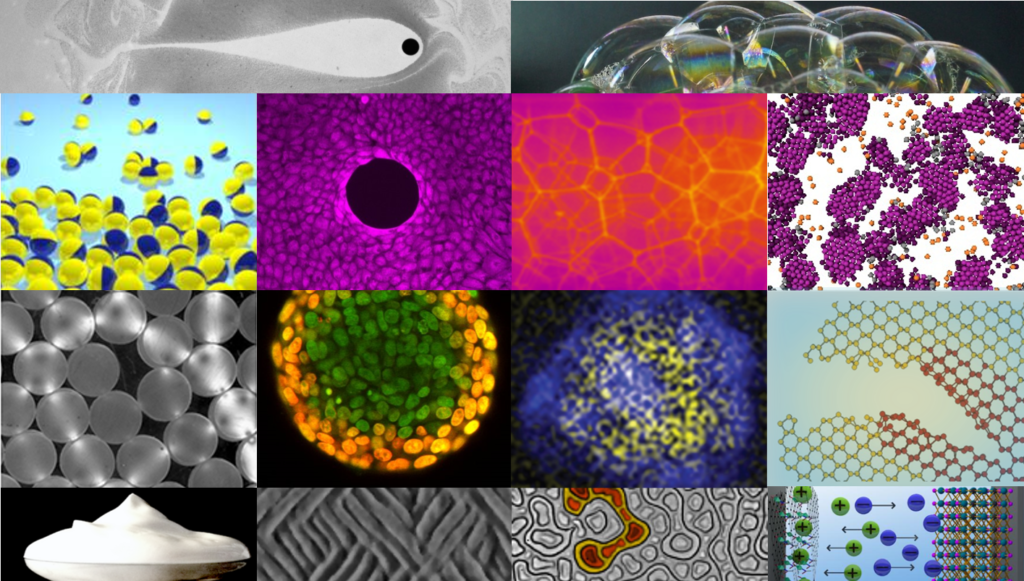Master of Physics in Complex Matter

Explore the Physics of Complexity
The Complex Matter (MaX) track of the Master’s program in Fundamental Physics and Applications offers an in-depth exploration of physical systems that defy simplicity: disordered, heterogeneous, out-of-equilibrium, or self-organized—whether in everyday materials or living systems. Bridging fundamental research and real-world applications, the program equips students with the knowledge and tools to understand, model, and innovate in fields at the frontier of contemporary physics.
Objectives
The Complex Matter (MaX) track of the Master’s in Fundamental Physics and Applications trains students to explore and understand the physics of systems that are structurally or dynamically complex—such as disordered, heterogeneous, out-of-equilibrium, self-organized, or active systems. These include a wide range of materials and phenomena: glasses, foams, gels, colloids, polymers, granular media, and even living matter.
With a strong focus on research, the program prepares students for doctoral studies in both academic and industrial contexts. It also provides access to a variety of career opportunities in major research institutions, universities, and high-tech sectors where complex materials are central to innovation and design.
By addressing systems found in both natural and engineered environments—whether biological, geophysical, or industrial—the MaX program offers a solid and versatile scientific foundation. It enables students to engage in both fundamental research and applied R&D, in fields ranging from everyday materials to the physics of life.
Skills
The MaX program strengthens core knowledge in physics—including electromagnetism, quantum physics, condensed matter, and continuous media (both liquids and solids)—while introducing students to more specialized areas such as advanced statistical physics, nanophysics, soft matter, living matter, and materials for energy storage and transport.
This strong theoretical foundation is complemented by robust hands-on training in imaging techniques, structural characterization, numerical modeling, and the use of artificial intelligence tools—including machine learning—applied to physics.
Students develop a broad and adaptable skill set, fully aligned with the current challenges of both fundamental and applied research.
Curriculum
The program includes fundamental courses and practical courses, covering scientific concepts relevant to complex matter, experimental techniques and numerical tools.
1st Year
Physics of continuous media
Physics of condensed matter
Electromagnetism and matter
Quantum mechanics and applications
Statistical physics of interacting systems
Nanosciences
Physics applied to biology
Soft matter introductory course
Optical instrumentation
Nano and micro-structural characterization
Numerical modelling
Lab classes
Research internship
2nd Year
Out-of-equilibrium statistical physics
Self-organization of matter and life
Mechanics of interfaces and heterogeneous materials
Physics of glassy solids
Soft matter and complex fluids
Wetting and thin films
Imaging of soft matter and life
Energy storage and conversion at nanoscales
Photonic and plasmonic nano-objects
Structure and dynamics at micro-scales
Artificial intelligence applied to physics
Atomistic and ab-initio modelling
Research internship
Careers
The MaX track primarily prepares students for careers in research, as researchers or academic faculty, both in academia and in industry. It also opens pathways to positions in R&D, scientific project management, or teaching roles in the public or private sector.
Each year, a majority of graduates go on to pursue a PhD, with numerous funding opportunities available through public research grants or industrial partnerships. On average, 65% of students begin a doctoral program immediately after completing the Master’s, reflecting the program’s strong reputation among research labs and companies.
Application timetable: Students living in Europe (March. to June) – Students not living in Europe (Oct. to Dec.).
Direct admission in 2nd year is possible after examination of previous curriculum.
Contact – loic.vanel@univ-lyon1.fr, Professor at Institute of Light and Matter (http://ilm.univ-lyon1.fr), University Lyon 1, France.
